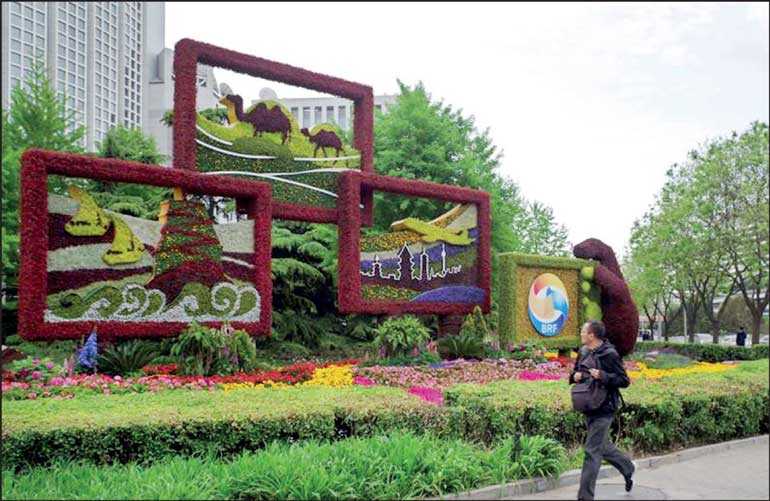Thursday Feb 19, 2026
Thursday Feb 19, 2026
Monday, 22 April 2019 00:00 - - {{hitsCtrl.values.hits}}

A man walks past a flower installation set up for the upcoming Belt and Road Forum in front of the Chinese Foreign Ministry in Beijing, China - REUTERS
BEIJING (Reuters): China’s Belt and Road project is not a “geopolitical tool” or a debt crisis for participating nations, but Beijing welcomes constructive suggestions on how to address concerns over the initiative, the government’s top diplomat said on Friday.
Beijing will host a Belt and Road summit next week which 37 foreign leaders will attend, including some of China’s closest allies, though the United States which has been critical of the project is only sending low level representatives.
The Belt and Road Initiative, as it is formally called, is a key initiative of President Xi Jinping, and envisions rebuilding the old Silk Road to connect China with Asia, Europe and beyond with massive infrastructure spending.
But it has proved controversial in many Western capitals, particularly Washington, which views it as merely a means to spread Chinese influence abroad and saddle countries with unsustainable debt through nontransparent projects.
The United States has been particularly critical of Italy’s decision to sign up to the plan last month, during Xi’s visit to Rome, the first for a G7 nation.
Chinese State Councillor Wang Yi, the government’s top diplomat, told reporters that the Belt and Road scheme had brought real benefits to participating countries.
“This partnership relationship is not a geopolitical tool, but a platform for cooperation,” he said.
“You can’t put hats like ‘debt crises’ onto the head of the Belt and Road, and this is not something any participating country would recognise,” Wang added.
“Of course, there is a development process for the Belt and Road. You can’t get there in one step, and it’s unavoidable it will cause some worries during its development. So we welcome all sides to come up with constructive suggestions,” he said.
Close allies coming
The number of foreign leaders at the April 25-27 summit is up from 29 last time, mainly from China’s closest allies like Pakistan and Russia but also Italy, Switzerland and Austria.
The United States will not send high-level officials, a US State Department spokesman said earlier this month, citing concerns about financing practices for the initiative.
Wang said there would be Americans at the summit, made up of diplomats, state-level officials, executives and academics, though he did not give details.
“We welcome any country that is interested to take part. When the United States participates, or whether it participates, is up to them to decide,” he added.
While the United States and China are currently working to end a bitter trade war, they have numerous other areas of disagreement, including human rights and US support for self-ruled Taiwan.
China last week condemned as “slanderous” criticism US Secretary of State Mike Pompeo made of Beijing’s policies in South America last week.
“The United States has no plans to send high-level officials from Washington to the Belt and Road Forum,” a US Embassy in Beijing spokesman said.
“We call upon all countries to ensure that their economic diplomacy initiatives adhere to internationally-accepted norms and standards, promote sustainable, inclusive development, and advance good governance and strong economic institutions.”
At the first Belt and Road summit two years ago, the United States submitted a diplomatic note to China complaining about North Korea’s participation, though since then Washington and Pyongyang have sought to re-set ties, including with two summits between their leaders.
Wang said North Korea would also take part in this year’s summit, but gave no further details.
“I think this is normal as it’s an economic cooperation initiative. All countries have the freedom to attend, but I think they don’t have the right to prevent any other country from participating. This is an open, inclusive platform.”
More than 150 countries are sending delegations, and there will be some 5,000 guests, Wang said.